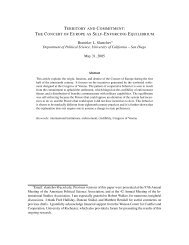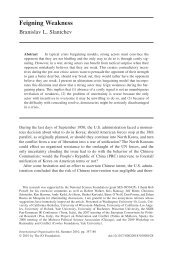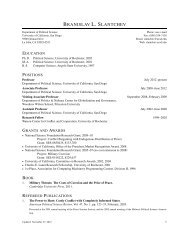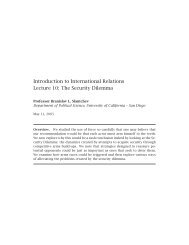Game Theory: Repeated Games - Branislav L. Slantchev (UCSD)
Game Theory: Repeated Games - Branislav L. Slantchev (UCSD)
Game Theory: Repeated Games - Branislav L. Slantchev (UCSD)
You also want an ePaper? Increase the reach of your titles
YUMPU automatically turns print PDFs into web optimized ePapers that Google loves.
Proof. Assume there is a pure strategy profile a such that g(a) = v. 8 Consider the<br />
following strategy for each player i: “Play ai in period 0 and continue to play ai as long<br />
as (i) the realized action profile in the previous period was a, or (ii) the realized action in<br />
the previous period differed from a in two or more components. If in some previous period<br />
player i was the only one not to follow profile a, then each player j plays m i<br />
j for the rest of<br />
the game.”<br />
Can player i gain by deviating from this profile? In the period in which he deviates, he<br />
receives at most maxa gi(a) and since his opponents will minimax him forever after, he will<br />
obtain vi in all periods thereafter. Thus, if player i deviates in period t, he obtains at most<br />
(1 − δ t )vi + δ t (1 − δ) max<br />
a gi(a) + δ t+1 v i.<br />
To make this deviation unprofitable, we must find the value of δ such that this payoff is<br />
strictly smaller than the payoff from following the strategy, which is vi:<br />
(1 − δ t )vi + δ t (1 − δ) max<br />
a gi(a) + δ t+1 v i








